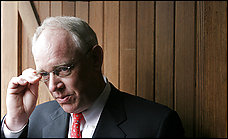|
Still Keeping An Eye on Trouble in Boardroom
| |
|

Richard C. Breeden, securities watchdog turned hedge fund
manager, advocates on shareholders' behalf. "I've yet to come
across public companies that had problems you couldn't fix," he
says.
(By Yoni Brook For The Washington Post) |
By Tomoeh Murakami Tse
Washington Post Staff Writer
Thursday, June 14, 2007
GREENWICH, Conn. -- In Washington, he is known as the former
Securities and Exchange Commission chairman who backed shareholders in
corporate boardrooms and pushed for tougher enforcement against Wall
Street delinquents.
Now, outside the Beltway spotlight, in a converted farmhouse in this
tony town 30 miles from Manhattan, Richard C. Breeden is reinventing
himself as head of an exclusive investment fund bearing his name.
That a former securities watchdog would turn money manager may seem
unusual. After all, Breeden Capital Management, which requires a
minimum $5 million investment, is frequently referred to as a hedge
fund -- a lightly regulated industry criticized for its opacity.
But Breeden's $1 billion fund, which last week marked its first
anniversary, is part of a growing pool of investment money set up to
agitate executives at companies thought to be undervalued and
inefficiently run. These so-called relational investing funds
generally acquire substantial stakes in companies and wield their
power as shareholders to press for changes in management or corporate
strategy, sometimes by gaining seats on boards of directors.
"If your performance is weak, make it strong. If you're balance sheet
is weak, make it strong," said Breeden, who has also worked at an
accounting firm and has served as outside monitor to such
scandal-ridden companies as WorldCom. "I've yet to come across public
companies that had problems you couldn't fix."
Applebee's International became
Breeden's inaugural target, when he nominated himself and three others
late last year to run against management's candidates for the board. A
months-long fight ensued, during which the restaurant chain portrayed
Breeden as a stubborn activist, and Breeden criticized the company for
"bloated expenses" and "unhealthy governance practices."
With a proxy fight looming before its annual shareholders' meeting in
May, Applebee's agreed to give Breeden and one of his nominees,
Laurence E. Harris, a Washington lawyer, seats on the board and on key
committees. The deal with Applebee's restricts Breeden and his fund
from engaging in further proxy contests and from putting forth
shareholder proposals.
His work with Applebee's may have quieted the skepticism of some in
investing and corporate governance who were surprised that Breeden,
with virtually no money-management experience, launched a fund, and
moreover, was able to raise $1 billion in one year.
"A lot of people were skeptical about his getting into this area. . .
. It's legitimate to question what relevance [his background] had to
running an activist hedge fund," said Gary Lutin, an investment banker
at Lutin & Co. who advises shareholders on corporate control matters.
And while a year is not enough time to judge a fund's success, Lutin
said, "so far, Breeden's proven to be much more effective than the
general run of screaming activistas."
Breeden said that what he is doing -- "engaging with companies to fix
problems" -- is not really new to him.
He was the court-appointed monitor at telecommunications giant
WorldCom after its accounting scandal and recommended changes in its
corporate governance. He was also tapped by the board of Hollinger
International, a newspaper publisher, to investigate corporate abuses.
Breeden's report accused former managers, including Conrad Black, now
on trial for racketeering and other charges, of running a "corporate
kleptocracy."
Even in government, Breeden's activist streak was evident. While he
was SEC chairman, from 1989 to 1993, he took positions that led to the
demise of investment banking firm Drexel Burnham Lambert stemming from
securities fraud and the punishment of Salomon Brothers over
bond-trading violations. On the corporate governance front, Breeden's
SEC passed rules that required increased disclosure about companies'
financial performance and executive pay.
Breeden battled with Treasury Secretary Nicholas F. Brady over
increased SEC control of the government bonds market. That effort
failed, but several laws were passed during Breeden's tenure that gave
the commission more power to combat market fraud.
Breeden's history of working with public companies helped persuade the
California Public Employees' Retirement System to become one of the
earliest investors in his fund, said Christy Wood, a senior investment
officer with Calpers. The country's biggest pension fund invested $400
million last year and intends to commit more money, Wood said.
According to Calpers, Breeden's fund, which aims to outperform the
Standard & Poor's 500-stock index by 10 percent over the long term,
returned 16.6 percent in its first six months. It beat the broad index
by 2.82 percent.
"It's one thing to get the financial analysis to figure out how the
company could improve," said Christopher Ailman, chief investment
officer of the California State Teachers' Retirement System, another
large pension fund that plans to invest in Breeden's fund. "But
selling that to management, and more importantly, selling that to the
board and getting them to listen to you is truly a very finite skill."
Calpers and Calstrs have increased their investments in activist funds
in recent years. Calstrs, for example, made its first such investment
two years ago, when it committed $800 million to two funds; it will
soon have $2.5 billion of its $170 billion portfolio committed to nine
activist funds, Ailman said.
Breeden, 57, has not declared his next battleground. But his fund has
accumulated shares in companies including
H&R Block, the tax preparer that
recently sold its troubled subprime mortgage division, and
Bausch & Lomb, an eye-care
product maker that last month agreed to a private-equity buyout. The
fund also has nearly a 10 percent stake in Acco Brands, an
office-supply company.
"2008 will be here before you know it," Breeden said.
|